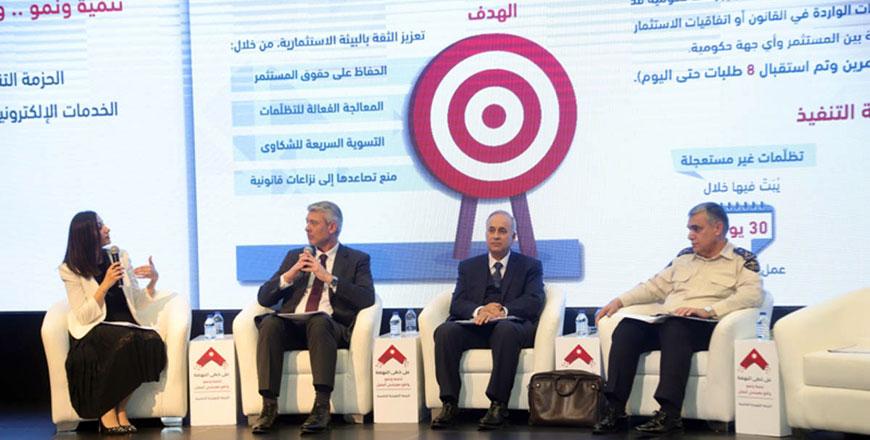You are here
Fifth executive bundle expedites grievance procedures — panel
By Bahaa Al Deen Al Nawas - Feb 17,2020 - Last updated at Feb 17,2020

Jordan Investment Commission Secretary General Faridon Hartouqa, Director General of the Income and Sales Tax Department Hossam Abu Ali (second from right) and Jordan Customs Department Director General Maj. Gen. Abdul Majeed Rahmaneh (right) participate in a panel discussing the government’s fifth executive bundle to stimulate the economy on Monday (Petra photo)
AMMAN — The government's fifth executive bundle to stimulate the economy, announced on Monday, includes a "clear mechanism" to resolve tax- and investment-related grievances from citizens and investors, Jordan Investment Commission (JIC) Secretary General Faridon Hartouqa said on Monday.
Hartouqa was speaking during a panel discussion held at the Royal Cultural Centre in Amman, which also saw the participation of Director General of the Income and Sales Tax Department (ISTD) Hossam Abu Ali and Jordan Customs Department (JCD) Director General Maj. Gen. Abdul Majeed Rahmaneh.
"There are three main goals we want to achieve through the grievances system: Improving investors' trust in the Jordanian investment environment, properly resolving grievances and finding a quick and effective mechanism for resolution, as time is a very important factor in this matter," Hartouqa noted.
According to the JIC secretary general, the new system sets a period of 15 days for resolving urgent cases and 30 days for regular cases, while previously there was no timeframe for resolving grievances.
"We hope this will reflect on Jordan's investment environment in international competitiveness reports," Hartouqa said, noting that the system already began its operations on January 23 and is currently working to address eight grievances.
Grievance are submitted online, Hartouqa said, noting that the JIC still provides all the necessary support for non-grievance cases and directs investors to other entities that provide investment-related assistance as necessary.
For his part, Abu Ali said that Jordanian law allows taxpayers — both individuals and companies — to apply for a grievance case, which can be administrative or judicial.
"If the taxpayer and the auditor are at conflict, the law allows them to take the issue to the grievance committee formed within the department, and if the auditor remains at conflict with the committee, the taxpayer can then seek the judiciary," the ISTD director general explained.
To simplify and speed up the process, the government created a mechanism for resolving pending issues between the ISTD and taxpayers, which includes allowing all involved parties to participate in the resolution process through a specialised public-private committee headed by a judge.
According to Abu Ali, the committee has three main components: A judge, who heads the committee, a private sector representative and a representative from the ISTD.
This service, he noted, became available at the ISTD on Monday.
Rahmaneh, for his part, explained that the JCD has a similar committee whose job is to achieve objectivity, reduce costs and resolve customs-related grievances.
The JCD director general said that appealing to the judiciary is much costlier than resolving an issue through the committee, which is also headed by a judge and has a representative from the private sector and another from the customs department.
According to the panellists, investors, citizens and taxpayers can seek the specialised committees to resolve their grievances within a limited timeframe, with the goal of full objectivity and justice.
Related Articles
AMMAN — The Jordan Investment Commission (JIC) on Wednesday took part in the 2021 digital edition of the Annual Investment Meeting (AIM).Dur
AMMAN — The Cabinet on Wednesday approved the investor grievances by-law for 2019.
AMMAN — The Jordan Investment Commission (JIC) has handled a total of 732 applications and inquiries since it began remote work due to the c

















